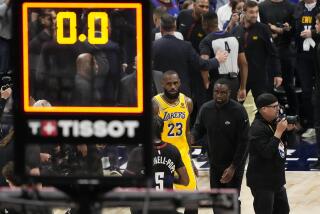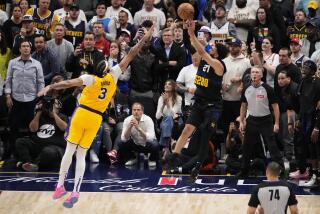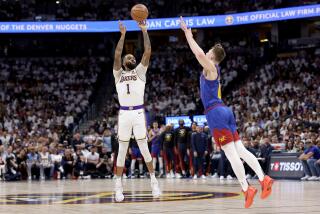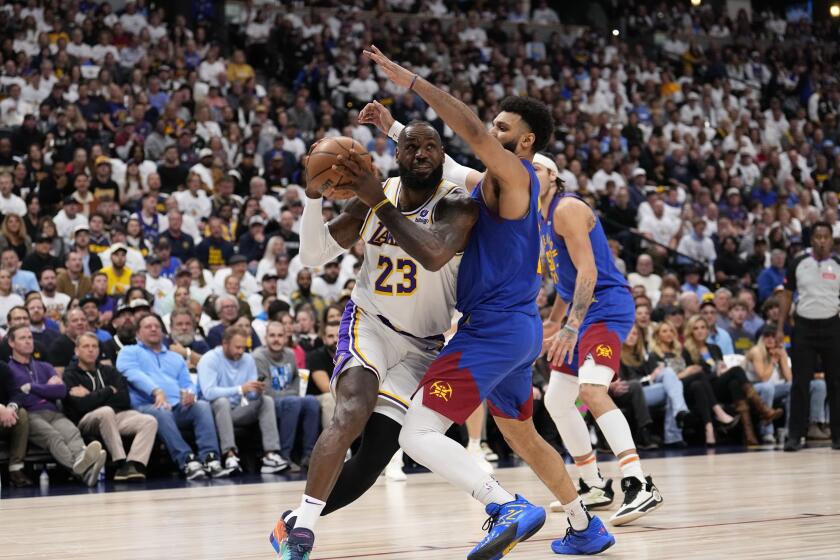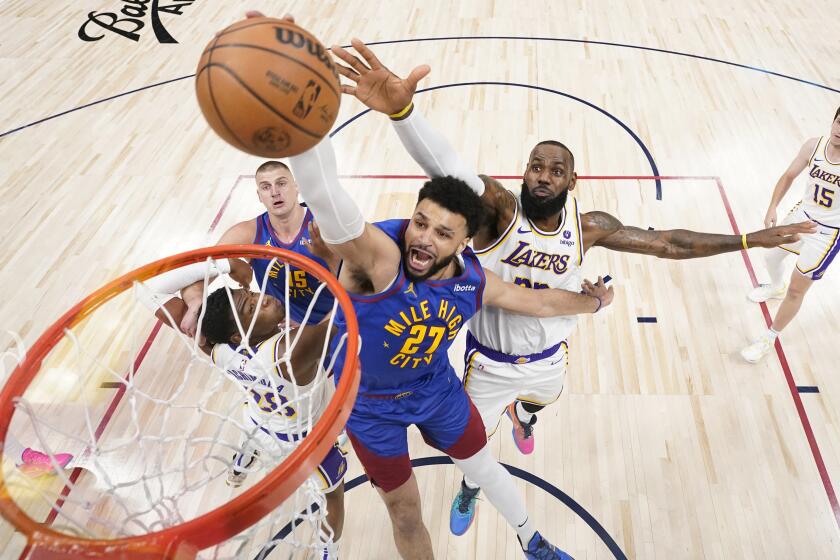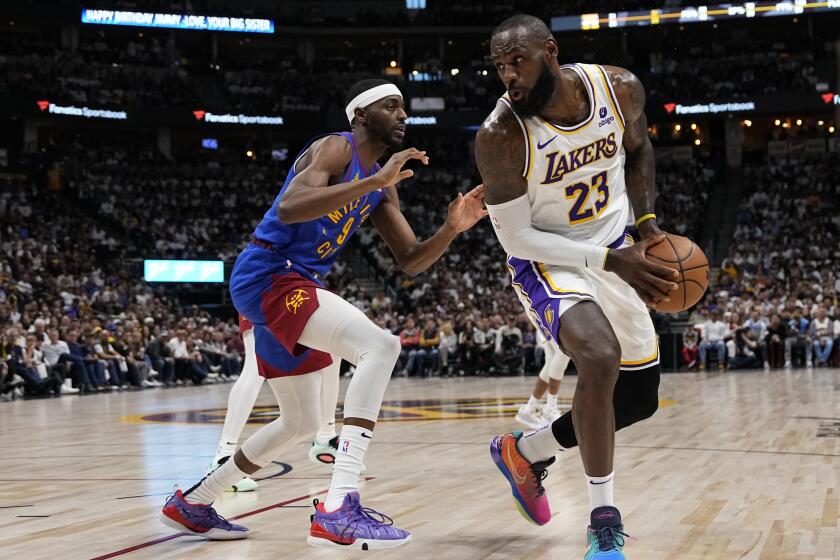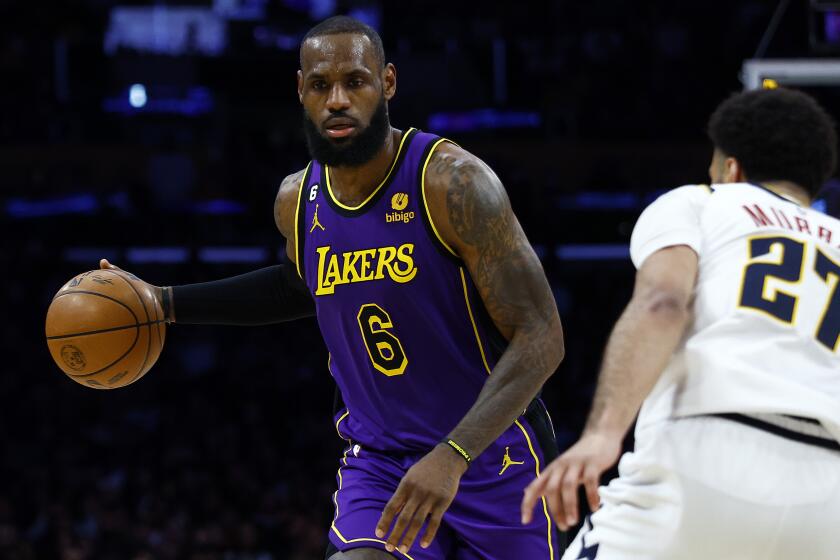Sharing a win they didn’t see
It will be a shame if the lasting images of Thursday night’s Lakers victory celebration are burning cars, marauding mobs and bottle-throwing crowds.
The antics of a bunch of losers shouldn’t obscure the patience, goodwill and high spirits of the thousands of fans who ventured downtown for a communal party and wound up being treated like pariahs.
They were shooed away from Staples Center, locked out of L.A. Live, swept off sidewalks and herded onto street corners, where their only way to gauge the Lakers’ progress was through the body language of the folks they glimpsed through the windows of restaurants that they’d arrived too late to patronize.
I spent the game wandering near the arena with them — young married couples, packs of boisterous guys, families with kids wrapped in Lakers gear; multiethnic, economically diverse throngs whose street-corner celebrations were all whoops and high-fives and hugs.
I had hoped to hook up with fans watching the game at restaurants in the city’s showy new downtown plaza. But every business was packed. The basketball game had barely begun when LAPD officers were summoned to dispatch growing crowds in the area.
“Keep moving, keep moving.” The command came over the loudspeaker as a phalanx of officers advanced, moving us off the paseo and onto crowded Figueroa Street. They pulled metal gates across the entrance to the complex to keep us out.
I felt the mood subtly shift, from high-spirited to apprehensive. I heard it in the grumbling of fans, saw it in the young mother who scooped up her kids and scurried off, recognized it in the twinge of fear I felt.
A surge of adrenaline made me wonder: When does lively become rowdy and a crowd become a mob?
Three hours later, I would find out.
::
The LAPD strategy was clear — and sound: Give the crowds the sidewalks. Keep the streets clear. Stop folks from congregating in large groups. Block off commercial targets and Staples Center.
They deserve a lot of credit for controlling the chaos. Everywhere you looked there were cops: on horseback, scooters, motorcycles and bikes, in buzzing helicopters and siren-blaring black-and-whites. If that set some nerves on edge, it also made clear who was in charge.
But it was hard not to feel unwanted. “If you don’t have a ticket, go home” was the officers’ message — explicitly delivered and universally ignored.
The fans I talked to were disappointed. Some people, expecting a Jumbotron, had planned to watch the game outside the arena. Instead, Chick Hearn Court was blocked off and the only public screens showed movie previews. Other fans were blaming themselves for not arriving earlier, when $20 could have landed a seat at Lawry’s and The Farm still had openings at the bar.
But none of that seemed to dim their glee, or the sense of community. I talked to people like Oscar and Evelyn Lopez, who spent two hours driving in from Palmdale and $20 to park, then wound up watching the game on their iPhone, on the sidewalk at Figueroa and Chick Hearn Court.
Like everyone around them, they had on Lakers jerseys. And they weren’t sorry they came out. There’s something about celebrating in public that you can’t get in your living room.
They were there to share a love of the game, the team and something more, I think: the pride that comes from being public winners in an era of so many private losses — lost homes, lost jobs, lost hope. The Lakers win felt like an antidote.
You didn’t have to love basketball to join the celebration. Like the Filipino family I ran into — three generations strong — at their first big-time sporting event. They all wore Kobe Bryant jerseys, even baby Taylor in her mother’s arms. Mom did a jig as the clock ticked down.
We kept score, thanks to a young Latina with purple-and-gold nails, who was on the phone with a friend watching at home. “Y los Celtics? Cuanto?” she said into the phone. When she announced we were 8 points ahead, the homeless, one-legged guy in a wheelchair next to me pulled out a Laker flag from his pack and stuck it in his gray ponytail.
For them — for us — it wasn’t so much about a team but a city’s victory. “We won, we won…” rang through the air. Friends hugged, strangers high-fived.
And police officers readied their riot gear.
::
I could see the makings of trouble then, as the cops snapped down their helmet shields and the television cameras moved in for crowd shots.
Rowdy young men pushed to the front, screaming and throwing gang signs for the cameras. Officers began barking orders. “Watch out, they’re going to start spraying,” I heard a young man say as a group of wide-eyed children watched.
As I made my way north along Figueroa, I could see the combustible formula: Staples Center patrons surged out toward their cars into a celebrating crowd made ever larger by the drunken revelers pouring out of downtown bars.
I passed a guy setting a fire in the street outside a parking lot, and heard a voice call out “Rush’em” as officers tried to keep the crowd back. When two cops ran by with rifles drawn, I hightailed it to the subway station.
I felt heartsick in the car on my way home, listening to the radio accounts of fires, injuries, arrests.
Then I thought of all I had seen away from the spotlight and the cameras: the other Los Angeles fans, who found a way to enjoy a championship game they couldn’t watch, and made do with horns and key chains and Lakers flags, and the company of strangers in sidewalk camps.
That things weren’t worse is a credit to those fans, not just the hundreds of police officers on hand.
How about we do right by them next time, treat those fans like they belong?
If we can marshal a police force 800 strong, surely we can come up with a couple of Jumbotrons and an outdoor party for the most of us — the ones without the courtside seats but with plenty of pride in our team and in our town.
More to Read
All things Lakers, all the time.
Get all the Lakers news you need in Dan Woike's weekly newsletter.
You may occasionally receive promotional content from the Los Angeles Times.
